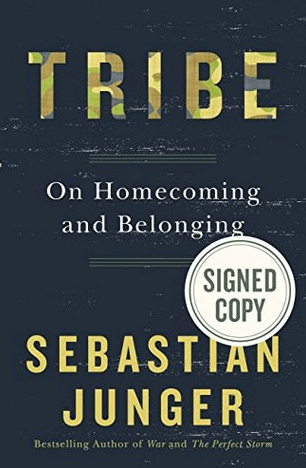
Tribe
This book is for anyone who wants to understand the deeper reason for being part of a tribe and the benefits of war.
Sebastian Junger is an ex-military man. He served in many posts overseas including Afghanistan. He has a surrogate uncle who was an American Indian and exposed Junger to their culture from an early age. Both were a huge influence in the stories and explanations of what it means to be a part of a tribe.
When Europeans invaded the States war broke out with the American Indians. During this time of war, some Europeans rejected their white heritage and joined the American Indians tribe, their way of life and never returned. There were social bonding not seen before in white culture. Never did an American Indian join the Europeans. Junger wondered why?
There was a communal nature of an Indian tribe held to a higher appeal than the material benefits of the Western civilisation. People were prepared to swap physical comfort for social comfort. Indian clothing was more comfortable, Indian religion was less harsh, India society was essentially classless and egalitarian.
Because of these basic freedoms, tribal members tended to be exceedingly loyal. Cowardice was punished by death, as was murder within the tribe or any kind of communication with the enemy. It was an ethos that promoted loyalty and courage over all other virtues and considered the preservation of the tribe an almost sacred task.
They disapproved of selfishness or hording. As you can imagine if there is only a small number of food supplies and someone hoards it, then they threaten the survival of the tribe. They would have occasionally endured episodes of hunger and hardship. The tribe would have raised their children and had involved childcare. They would have done almost everything in the company of others. They would have never been alone.
We on the other hand western society is alone from a very early age. We are put in a cot away from our parents, sometimes even in a separate room as an infant. We strive for more financial security over social security and not understanding that with every pleasure comes a pain. Financial independence as Junger states can lead to isolation, and isolation can put people greatly increased risk of depression. Maybe there are high degrees of fantasies in the mindset of the wealthier.
The need to feel connected is deeply rooted. In the hunter-gather societies, the mothers carried their
babies up to 90% of the time, which is roughly the carrying rate of other primates. Touch is an important part of human experience. Babies without touch in an orphanage were more likely to die because of a lack of affection than those that received enough. Monkey’s in an experience where there were two wire monkeys, one with food, the other with a soft blanket. They infants had their food and went back to the soft wired monkey as the softness provided the illusion of affection.
As nothing is missing, maybe this is why babies and children in western societies will cling to a toy or animal because it provides themselves with that level of affection and connection they so greatly need.
Some individuals will reject society and society bonds all together and attack people who are unprepared. For modern society, that would be in movie theatres, schools, shopping centers, places of worship or simply walking down the street. Yet, if we go back to world war two, rampage killings significantly dropped and have rose again in the 80’s and continue to rise.
Modern society has disrupted the social bonds that characterized the human experience and that disasters thrust people back into a more ancient, organic way of relating. Take New York city after 9/11. there were no rampage shooting for the next two years across the US. In New York, the rate of violent crime, suicide, and psychiatric disturbances dropped immediately. Murder rate dropped by 40%, pharmacists saw no increase in the number of first time patients filling prescriptions for antianxiety or antidepressant medication. There was a social unity that followed. This experience created more mentally healthy conditions. Everyone gathered together to fight against something, like a family fighting with its neighbors, or a country fighting against another. Peace and war being conserved.
It was the same during wartime. You would assume that depression and anxiety would go up, but it actually went down. People did better during wartime. Men in peaceful areas were depressed because they couldn’t help their society participate in the struggle. They lacked having purpose and without purpose and a sense of helplessness, men has depression.
When interviewing a lady who was 17 at the time the Bosnian war broke out. She said that it was the happiest time, we laughed more. There was a bonding in the community never seen before. She felt as if she was contributing to her community. She once received an egg and didn’t know how to share one egg with her community so she made pancakes.
Hardship can turn out to be great blessings. Humans don’t mind hardship; in fact, they thrive on it. So we have seen that during wartime, people have a purpose, they had connection, two of the greatest human experiences.
Hugs and heart,
